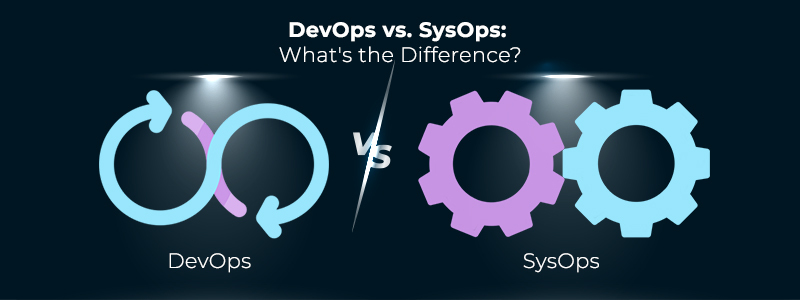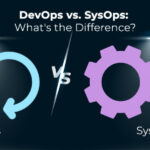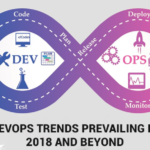Unless you avoid getting into the IT world, we doubt you haven’t heard of DevOps and SysOps. But given the digital age, it’s tough to stay aloof from the vast field of information technology. That said, simply being aware does not serve you any purpose. Specifically when you have a hairline separating one from another.
Being into business, you might want to choose one of these for software development. Or, being into development, you may come across a client developing who might take up an approach but ideally requires another. It will affect the development lifecycle, but it will also cause the client to suffer losses. And no points for guessing what that costs on your reputation. Thus, hitting the bull’s eye is essential.
So to help you better, here we are helping you understand the both better and decode what makes them different. Let’s get started!!!
DevOps
DevOps is a blend of cultural philosophies, practices, and tools that enables software development organizations to deliver quality solutions faster. As an alternative to conventional software development and infrastructure management, it expands the scope for evolving and improving products. Overall, the process aims to deliver competent services to the clients and enable swift product development.
Benefits of DevOps
DevOps offers multiple benefits. Here we have highlighted some of the prominent ones for you:
- Speed: Take charge of your services and release updates quickly with effective use of microservices and continuous delivery. This enables the development teams to move faster through the lifecycle, adapt to market requirements, and drive business results efficiently.
- Rapid Delivery: Augment the pace of software delivery to enable faster update releases. Automate significant aspects of project development with continuous integration and delivery models to enable rapid delivery.
- Reliability: Use part and parcel of DevOps, like continuous integration and delivery, to ensure application quality combined with exceptional software reliability.
- Scalable: With the ease of automation, manage complex or changing systems with reduced risks.
- Improved Collaboration: Build great teams with DevOps cultural models that focus on ownership and accountability. With shared responsibilities, DevOps enables the developers and operations systems to collaborate close and combine the workflows.
- Security: DevOps rapid delivery does not take a toll on the security models of your application. You can move ahead quickly while innovating and relation control and preserving compliance.
SysOps
SysOps was conventionally used to describe the professionals who care for a computer system. However, with the blend of advanced cloud computing, the term is popularly used to refer to the professionals responsible for multi-user systems.
SysOps follows the ITIL delivery style. These guidelines are a set of IT service management guidelines that comprehend business goals in terms of IT services. They allow the organization to set a base that guides various aspects of project development, including design, execution, and parameters. With SysOps, engineers can show compliance better and estimate the improvements.
Difference between SysOps and DevOps
While multiple areas make SysOps and DevOps similar, some regions make a striking difference between them. For instance, SysOps is based on the continuous delivery model such that teams can develop, write, test, and launch the software in a shorter time span. DevOps makes effective use of automation to ensure reliable and rapid software delivery.
Here, let’s explore some of the features that set them apart.
Delivery Methodology
- SysOps functions on ITIL delivery methodology (Information Technology and Infrastructure Library).
- DevOps is strictly based on the strong coordination between the participating teams (developers and operations teams, most of the time)
Code Development
- The SysOps team prefers consistent code change rate and deployment when supporting the software development teams.
- DevOps prefers unpredictable code change rates and code deployments.
Change Handling
- SysOps favors risk-free continuation of services and does not entertain a scope for change.
- DevOps is pretty flexible to the changes. It provides enough scope for the development and operations team to coordinate and implement the changes.
Change Entity
- SysOps requires the teams to deploy changes via the server.
- DevOps team implements the changes via code.
Service Approach
- SysOps emphasizes smooth organization-specific operations and processes.
- DevOps focuses on enhancing an organization’s business value.
Infrastructure management
- Centralized around infrastructure, take care at the individual level.
- It is centralized around infrastructure taken care of by automation tools.
Take-Home Message
The Digital era needs businesses to upgrade their models. This, in turn, makes them dependent on the IT teams to foster more innovative companies. IT has been serving them as the most significant source of success with promising long-term results. The considerable inclination towards IT has resulted in technical advancements, and SysOps and DevOps emerged as two of them.
Choosing between the two is entirely dependent on the requirements. Five factors that you can count on while selecting include:
- Load predictability
- Time for peak traffic and least traffic
- Required execution speed
- How rapidly do you need to adapt to changes?
- How fast should you be scaling during peak traffic?
- Determine if your business operates on a global traffic spike or the local one.
- Release frequency
While both systems have been acting as a tool to enhance the infrastructure, small things make them different from each other. However, the combination of both teams has been aiding the development teams best to align the products with the clients’ business goals. In other words, serve them with the best.
















